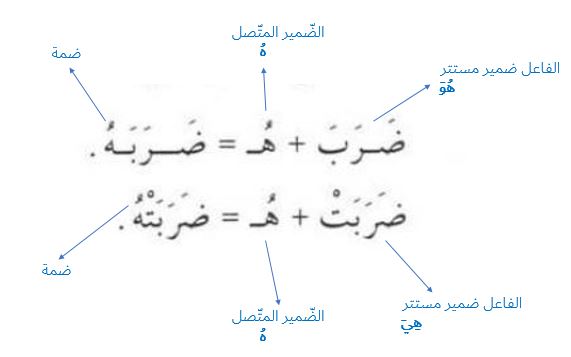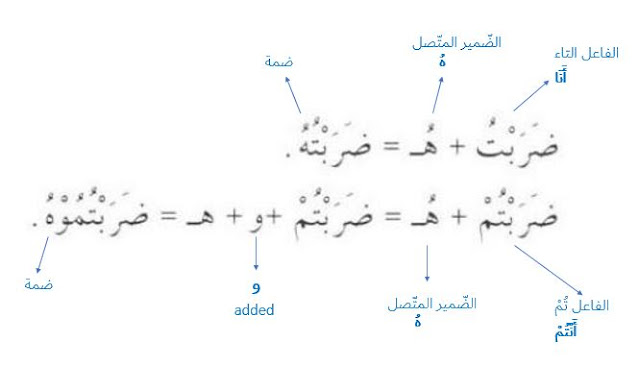The rules of nasb pronoun directly attached to the verb | Durusul lughah book 2 - lesson 7
We are still at the chapter seven.
We are going to learn damir muttasil as maf'ul bih or nasb pronoun as an object.
As you can see in the picture below, I will explain you one by one the rules how do we write nasb pronoun if it is directly attached to the verb.
The rules of nasb pronoun when directly attached to the verb
Observe the first picture.
1. ضَرَبَهُ
The meaning : he hit him
explanation
ضَرَبَ = contains fi'il madi and fa'il. => fa'il is damir mustatir that points to هُوَ (he).
So, ضَرَبَ means he hit.
هُ = damir muttasil (attached pronoun) as an object (maf'ul bih) which means "him".
Because this pronoun's function is an object, so we called as nasb pronoun.
The vowel sound of this pronoun is dammah "u"
Summary
- Fa'il is damir mustatir that points to هُوَ
- the vowel sound of nasb pronoun هُ in this case is dammah "u"
2. ضَرَبَتْهُ
the meaning : she hit him
explanation
ضَرَبَتْ = contains fi'l madi and fa'il => fa'il is damis mustatir that points to هِيَ (she).
تْ in ضَرَبَتْ is called تاء تأنيث (ta ta'nith), ta as indication of female.
So ضَرَبَتْ means she hit.
هُ = damir muttasil (attached pronoun) as an object (maf'ul bih) which means "him".
Because this pronoun's function is an object, so we called as nasb pronoun.The vowel sound of this pronoun is dammah "u"
Summary
- Fa'il is damir mustatir that points to هِيَ
- the vowel sound of nasb pronoun هُ in this case is dammah "u"
3. ضَرَبْتَهُ
the meaning : you hit him
explanation
ضَرَبْتَ = contains fi'il madi and fa'il => fa'il is damir muttasil تَ (you:singular, masculine).
so ضَرَبْتَ means you hit.
هُ = damir muttasil (attached pronoun) as an object (maf'ul bih) which means "him".
Because this pronoun's function is an object, so we called as nasb pronoun.The vowel sound of this pronoun is dammah "u"
Summary
- Fa'il is damir muttasil تَ (you:singular, masculine).
- the vowel sound of nasb pronoun هُ in this case is dammah "u"
4. ضَرَبْتِهِ
the meaning : you hit him
explanation
ضَرَبْتِ = contains fi'il madi and fa'il => fa'il is damir muttasil تِ (you: singular, feminine).
so ضَرَبْتِ means you hit.
هِ = damir muttasil (attached pronoun) as an object (maf'ul bih) which means "him".
Because this pronoun's function is an object, so we called as nasb pronoun.The vowel sound of this pronoun is kasrah "i".
Summary
- Fa'il is damir muttasil تِ (you: singular, feminine).
- the vowel sound of nasb pronoun هِ in this case is kasrah "i"
Why the nasb pronoun's vowel sound changes to "i"?
The answer : Because of "vocalic harmony".
Sound "ti-hi" sounds easier and better than "ti-hu", that's why we change the vowel sound of nasb pronoun to kasrah.
5. ضَرَبْتُهُ
the meaning: I hit him
explanation
ضَرَبْتُ = contains fi'il madi and fa'il => fa'il is damir muttasil تُ (I).
so ضَرَبْتُ means I hit.
هُ = damir muttasil (attached pronoun) as an object (maf'ul bih) which means "him".
Because this pronoun's function is an object, so we called as nasb pronoun.The vowel sound of this pronoun is dammah "u"
Summary
- Fa'il is damir muttasil تُ (I).
- the vowel sound of nasb pronoun هُ in this case is dammah "u"
6. ضَرَبْتُمُوهُ
the meaning: you hit him
explanation
ضَرَبْتُمْ = contains fi'l madi and fa'il => fa'il is damir muttasil تُمْ (you: masculine, plural).
So ضَرَبْتُمْ means you hit.
In the case of damir muttasil تُمْ , we must add "و" between verb and pronoun.
The vowel sound of م becomes dammah "u", and the vowel sound of nasb pronoun is "u".
Finally, we say "darabtumuuhu"
Recap
1. For the sake of vocalic harmony, the harakat of nasb pronoun ه changes to kasrah "i" when it is preceded by damir muttasil تِ .
It is easier and better to say "ti-hi"than "ti-hu".
Example : ضَرَبْتِهِ (darabtihi)
2. We add waw (و) between damir muttasil تُمْ and nasb pronoun ه
ضَرَبْتُمْ + هُ becomes ضَرَبْتُمُوهُ (darabtumuuhu).





No comments:
Post a Comment